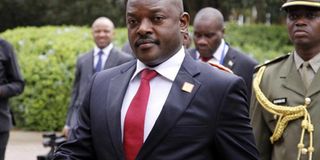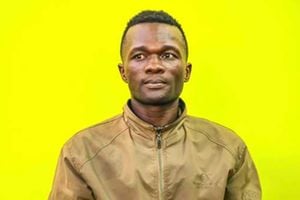Pressure grows on Burundi government as riots continue

Burundian President Pierre Nkurunziza. PHOTO | MORGAN MBABAZI |
What you need to know:
- Clashes between police and protestors, in which six people have been killed since Sunday, were reported from the capital Bujumbura and Gitega, the second largest city.
- People in the rural areas remained cut off from information as major independent radio stations remained off-air.
The United States announced announced it was sending a senior official to Burundi as the British government issued a travel warning to its citizens.
On Wednesday, the street protests against a third term for President Pierre Nkurunziza entered their fourth day.
Tom Malinowski, the US Assistant Secretary of State for Democracy, said he was "disappointed" President Nkurunziza was violating the Arusha Accord that ended more than a decade of civil war by seeking a third, unconstitutional term.
In a message posted on Twitter on his way to Burundi, the official added that it was, "not too late for leaders/people to stay on peaceful democratic path."
Witnesses spoke of a reduced level of unrest amidst reports of disruptions of internet access through mobile phones and social media apps, which activists have been using to coordinate their protests.
However, clashes between police and protestors, in which six people have been killed since Sunday, were reported from the capital Bujumbura and Gitega, the second largest city.
RURAL AREAS CUT OFF
People in the rural areas remained cut off from information as major independent radio stations remained off-air after authorities shut their countrywide broadcasts.
Pressure is mounting on President Nkurunziza's government to allow peaceful protests and resolve the political crisis, which arose after the ruling CNDD-FDD party nominated him to stand in the June 29 election, despite already having served two terms as spelt out by the constitution.
In a statement on Wednesday, the Peace and Security Council of the African Union expressed "deep concern" about events in Burundi and called for the urgent disarming of militias and illegal armed groups.
The Imbonerakure, a youth wing allied to the ruling party, has been accused of targeting and intimidating protestors and opposition supporters across the country.
The AU body will meet again on Thursday to review developments in the country.
Meanwhile, the UN Secretary-General's special envoy to the Great Lakes Region, who was sent to Burundi on a fact-finding mission on Monday, was scheduled to address the UN Security Council later on Wednesday via video tele-conference to appraise world powers on events in Burundi.
The Security Council issued a statement last week calling for calm ahead of the elections but is expected to provide stronger guidance following the outbreak of violence.
A spokesperson for President Nkurunziza said on Wednesday that the government would not give in to the demands of the protestors.
However, with growing international pressure, an appeal by a group of senators to the constitutional court to pronounce itself on the legality of the president's candidature offers the best solution to the impasse, diplomatic sources told the Nation.
On Wednesday the UK government advised its citizens to stay away from the country or leave using commercial means as a result of the security situation.





